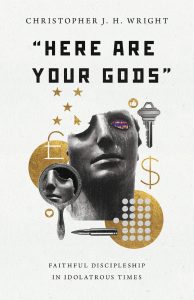
Christopher J. H. Wright is a missiologist, an Anglican clergyman and an Old Testament scholar. He is currently the International Ministries Director of Langham Partnership International. He was the principal of All Nations Christian College. He is an honorary member of All Souls Church, Langham Place in London, UK.
Listen to the full interview here (Begins at 23:32):
Partial Transcript:
Carmen LaBerge: Dr. Christopher Wright joins me now from London, England.
Carmen LaBerge: All right. Let’s start with Here Are Your Gods, because that is a direct reference to a passage of Scripture and a story that is at the center of the conversation, and then we’ll move to the subhead, because I do think that really frames the entirety of the book. You are helping us understand idolatry in the Old Testament, but then you are also helping us live as faithful disciples in the idolatrous times in which we currently find ourselves. Talk a little bit about Here Are Our Gods, for people who don’t recognize that biblical reference.

Christopher Wright: Yeah, sure, thank you. Yes, this actually comes twice in the Old Testament, “Here are your gods.” The first time is in Exodus 32, when the people of Israel have got to Mount Sinai and Moses is up the mountain receiving the instructions for the tabernacle, and the people come to Aaron, and they end up making that golden calf. Aaron then says to the people of Israel, “Here are your gods, oh Israel, who brought you up out of Egypt.” The next time it occurs is when Jeroboam led the northern tribes of Israel in rebellion against King Solomon’s son, Rehoboam, led them off into secession, and then set up idols in the south and the north of the kingdom, again bull calves, and said the same words, “Here are your gods, oh Israel, who brought you up out of Egypt.”
Christopher Wright: The point is that the “Who brought you up out of Egypt,” is an obvious reference to the Exodus and we know that it was the Lord, Yahweh, the God of Israel who did that. And yet, here they are, mixing statues and gods with the God of Israel. In both cases, it’s an act of what is sometimes called syncretism, that is that you claim to be, or you think you are, still worshiping the living God, but in fact you are engaged in worshiping idols, and in Israel’s case, the idols of the people around them. The Old Testament does have this analysis of idolatry and syncretism, and I think it’s well worth as a church at any time of our existence as the people of God to beware of the fact that we may have fallen into the worship of other gods, just as the Israelites did in the Old Testament. Apostle Paul says, “These things were written for our instruction and a warning,” and so therefore this book is trying to perhaps heed that warning.
Carmen LaBerge: I’m talking to Dr. Christopher Wright. We’re talking about his new book, Here Are Your Gods: Faithful Discipleship in Idolatrous Times. One of the things that I want to be sure people understand, because I think that you’re an Old Testament scholar and sometimes that sounds like something that we don’t necessarily want to spend a lot of time in, you are an Old Testament scholar who helps us understand why we are still Old Testament people. I mean you really do help us make the connection, bridge, maybe, the misunderstanding that people have sometimes. I do think that there are people who imagine that as Christians we only need the New Testament, but that’s not true. So thank you for another good work on that front, that actually helps us live practical discipleship that grows out of our understanding of who God really is, much of which we really learn from the Old Testament.
Christopher Wright: It’s crucial in order to understand our place in the story and who we are as God’s people today, to understand what God gave to us in the first parts of the story, acts one, two and three. I think that’s what the Apostle Paul means when he says that all these scriptures, meaning the Old Testament, were written by inspiration of God and are profitable. They’re for us, they’re part of our story. If we neglect the Old Testament and what it has to teach us, I think we’re the losers. It’s one of the reasons, I think, why the modern church is often very weak and very unaware of the idols in our midst, because we haven’t really paid heed to those warnings that Paul tells us about.
Carmen LaBerge: Here’s just a point of confusion. You call it a paradox. Let’s talk about what is idolatry, let’s do that, but then how is it even possible to have other gods if God is the one true and only God?
Christopher Wright: Ah, yes. Well, that’s because when we chose as human beings to reject the authority of the one true living God in what’s called the Fall, you know, back in Genesis 3, we can’t stop worshiping. We still have to have something that is greater than ourselves, something that we give allegiance to, something that gives us a sense of purpose and value and ultimacy. So we create those for ourselves. That will always be something either within creation or something, in some cases, demonic, but often just things that we value very, very highly, which we then treat as if they were ultimate, like wealth, like family, like our nation, like things within creation, like food, like sex, anything that is part of the good creation that God made. We can turn good things into god-things, which they shouldn’t be, and we neglect the living God Himself.
Carmen LaBerge: All right, we are talking about God, and we are talking about idolatry, and we are talking about discipleship, and we’re doing it all with Dr. Christopher Wright. The book is Here Are Your Gods: Faithful Discipleship in Idolatrous Times. Chris, talk a little bit about discernment. How do we discern the gods of today?
Christopher Wright: Well, I think one way of doing it is when we see what are the things that are most popular, most exalted, the things that are in a sense dazzling in a society. In ancient Israel, there were varieties of things which the prophets condemn which were idolatrous. One is the excessive pursuit of wealth, for example. They see that in Solomon and after, kings who build themselves great palaces and think that that’s the best way to be king. You also find dependence on armies and militaries and so on, again the Psalms are against that. They show that if you’re going after that kind of security, then it needs to be in God. They also expose the kind of self-exaltation that you get in some of the kings that the prophets expose, like Jeremiah.
Christopher Wright: I think the Bible helps us to discern wisely that there are aspects of fallen human culture, and I’m not just talking about any modern nation, but fallen human culture in general, going right back through the ages, in which we would exalt things and put things on pinnacles and pedestals, thinking that that is the way to be great, when that so often militates not only against what Jesus said, that it’ll be the greatest of you must be the least, the least will be among the greatest, but also the way the Old Testament asks Israel to be and asks Israel’s kings to be, that they should not be super Israelites but model Israelites, living under the law, living within the covenant, caring for the weak and the poor, exposing the kind of inequalities and injustices that would happen in society and rectifying them. Those are the things, I think, that God, the living God, cares about and that He delights in. When we go after false gods, we usually ignore those things.
Carmen LaBerge: This is a little bit of a side note, does it trouble you that programs like American Idol are wildly popular and that there are so many people pursuing to be America’s next idol, that we almost idolize idolatry today?
Christopher Wright: Well, yes. I mean I wouldn’t want to use… I wouldn’t put too much weight on that word. Obviously, yeah, American Idol, we have the same word over here, is a kind of popularized, somewhat trivial use of the word idolatry. Actually that’s part of the problem, is that when you trivialize something, you then lose sight of the reality. It’s the same way when people use words like demons or devils or hell or anything else in a trivial way, it conceals the fact that there are realities there that are very serious. The thing about something like American Idol is I would see it more as simply symptomatic of the cult of celebrity that somehow people suddenly want to be big and famous, simply for being big and famous. In actually accomplishing something… There’s nothing wrong with being famous and well known. Through history people have done amazing things and they are rightly praised for it and remembered for it, and we put up statues in their honor and that kind of thing. But when it becomes something almost like a hollowed-out cultural icon, then I think it speaks of a culture which has lost a deep sense of what is valuable and what is really worthwhile.
Christopher Wright: Again, I go back to my Old Testament, and you find Jeremiah speaking in Jeremiah, chapter 2, about the idolatry of his day. He says, “They pursued worthless things and became worthless themselves.” You become like what you worship. This is part of the reality of the biblical truth. If you worship the living God, you’ll be more and more made in his image and become more like Christ. If you worship all of these false idols, then you will be, in a sense, you’ll become their incarnation. You become like what you choose to worship and idolize. That’s what I think part of this cult of celebrity is doing to our culture and particularly to our younger generation.
Carmen LaBerge: Chris, let’s talk a little bit about political idolatry. You spend a fair amount of time in the book talking about that, so let’s just focus in on political idolatry then and now.
Christopher Wright: Well, I think, again, the Old Testament helps us to show that God is passionately interested in politics. I mean this is one of the big gaps often in our Evangelical Christianity, which is that we have sometimes thought that really, the Bible is only about getting to heaven when you die and getting your soul saved. If the Old Testament shows us anything, it shows that God cares about society. He cares about how society is governed. He cares about the integrity of leaders and governors, and particularly He is concerned about things like judicial process, about truthfulness, about integrity, about simplicity and humility. These are things that so often seem to go our the window when people are involved, these days, in political campaigning or even in political office in many parts of the world. We need to be clear that I see this particularly in Western cultures, but you find it also increasingly in Latin America and in some parts of Asia and elsewhere. It’s not a new thing, but the Old Testament does expose it, that politics is an arena in which God has very strong demands.


